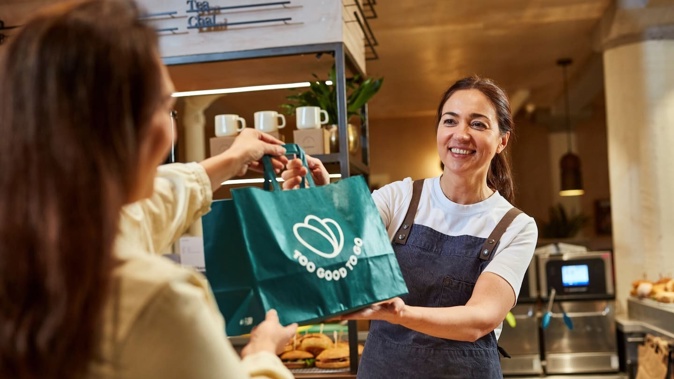
Danish social impact company Too Good To Go is expanding into New Zealand offering a marketplace for surplus food.
Born from the frustration of perfectly good food going to waste, the marketplace allows consumers to purchase surplus food from a variety of local stores, cafes and restaurants through “surprise bags”, offering foods at often a third of their usual price.
Too Good To Go describes the business model as a win-win-win: Kiwis get access to good food at a discounted rate; business partners make money from food that would otherwise go to waste; and together they help tackle climate change by reducing food waste.
Too Good To Go Aotearoa country director Joost Rietveld said the business was focused on reducing food waste across 19 countries with Aotearoa its 20th.
“With the country’s vibrant food culture and clear recognition of the value of food, Aotearoa was the obvious next step for Too Good To Go’s expansion across Asia Pacific,” Rietveld said.
“There is such a strong commitment to sustainability here, making it the perfect match for our mission to inspire and empower everyone to fight food waste together. We’re excited to invite Kiwis to join our global community and start saving their favourite foods from going to waste.”
The Too Good To Go app has more than 120 million registered users across Europe, North America and the Asia Pacific, with more than 500 million meals saved since 2016.
 Joost Rietveld, country director of Too Good To Go Aotearoa, says Aotearoa was the obvious next step for the business's expansion across the Asia Pacific region.
Joost Rietveld, country director of Too Good To Go Aotearoa, says Aotearoa was the obvious next step for the business's expansion across the Asia Pacific region.
Rietveld joined the business almost eight years ago, describing himself as someone who would often nag those around him about the need for a better food system.
“We’re not part of something else or a project or a side project of another company. Everyone in the company is working on one clear goal, and we have a very clear North Star, which is meals saved.
“When you have that clarity of the goal that you’re trying to work towards, it creates this driving force of coming to your workplace every day and contributing.”
Auckland is the business’s second location in the Asia Pacific region, following Melbourne in Australia. It will start in Auckland this year and roll out to other New Zealand cities in 2026.
Rietveld said the business had hired a local team and set up an Auckland office to better connect with local businesses.
It is in the process of confirming local partners, but in Australia the company was already working with the likes of Baker’s Delight, Muffin Break and Sushi Sushi.
Rietveld couldn’t confirm any partners ahead of time, but said there was a lot of excitement from initial discussions.
Rietveld said the marketplace had a subscription model based on a “no cure, no pay” principle, which takes a percentage of every surprise bag sale.
But he stressed that businesses won’t pay anything unless they sell food through the app, in other words, there’s no cost to a business for surplus food that doesn’t sell.
“We have deliberately chosen as a business to create a very low barrier for businesses to try it out. They always try it out for a minute and they can stop any time they want, no matter how long they’ve been working with us.
“That’s a very deliberate choice to make the decision to try this out and see if it adds value to your business. Our job is to actually bring that value forward through information and data.”
 The Too Good To Go app has more than 120 million registered users in 20 countries across Europe, North America and Asia Pacific.
The Too Good To Go app has more than 120 million registered users in 20 countries across Europe, North America and Asia Pacific.
According to Love Food Hate Waste, New Zealand wastes an estimated $3 billion worth of food annually, equating to $1364 lost on food waste per household per year.
Beyond just the economic impact, the World Wide Fund estimates that around 40% of all the food produced around the world is wasted, accounting for 10% of all greenhouse gas emissions worldwide.
Love Food Hate Waste’s Juno Scott-Kelly said she welcomed any new initiatives that helped to reduce food waste in Aotearoa.
“Too Good To Go has the potential to make a real impact by connecting consumers directly with surplus food from retailers and hospitality businesses that might otherwise go to waste,” Scott-Kelly said.
She said food redistribution happened across a spectrum. Some surplus food is suitable for charities and food rescue organisations like Kiwi Harvest, while other food - for example, prepared meals or items close to expiry - can be harder to redistribute safely.
“There’s room, and need for multiple solutions. Food rescue charities play a vital role in feeding people in need, and technology platforms like Too Good To Go complement this by tackling a different part of the surplus food chain.”
As for those thinking about giving the marketplace a try, Rietveld said Kiwis should be open to the idea of changing their habits.
“There’s so many things to think about when you’re running your operations, and many of us have decided waste is just part of doing business.
“What we’re trying to say is, we want everyone to just be open and give us a shot to show you that it could be different, and there’s a lot of economic upsides to it.”
Too Good To Go will be available in Auckland from October.
Tom Raynel is a multimedia business journalist for the Herald, covering small business, retail and tourism.
Take your Radio, Podcasts and Music with you









